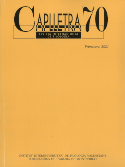On some active participles with motion verbs
DOI:
https://doi.org/10.7203/caplletra.70.19993Keywords:
active participles, unergative verbs, motion verbs, cognate objects, small clause, absolute constructions Abstract
Abstract
The aim of this study is to analyse the structures containing a participle combined with a motion verb, in cases such as venir plorat de casa (lit. ‘to come cried from home’ / intend. ‘to come after crying at home’). The interest of these data lies in the fact that the participles involved here are not active (plorat ‘cried’, tossit ‘coughed’), but they acquire an active reading when combined with verbs of movement (venir ‘come’, arribar ‘to arrive’). In this paper, we compile and describe the data that patterns this configuration and we propose some ideas for a possible formal analysis. Firstly, following Armstrong (2017), we propose that verbs such as ‘cry’ allow the formation of an active participle because they have an implicit object. We consider this active participle to be a secondary predicate selected by the verb. In particular, the participle projects a small clause which is an absolute construction, therefore it expresses an action which is finished and previous to the action of the main verb. Secondly, we propose that the main verb is an inherently directed motion verb that projects an unergative structure, and not an unaccusative one, what triggers an agentive interpretation of the subject.
 Downloads
Downloads
Downloads
Published
How to Cite
-
Abstract478
-
PDF (Català)276
Issue
Section
License
Authors submitting work to Caplletra for publication must be the legitimate holder of the usage rights. Legitimacy for the purposes of publishing the work must also include images, tables, diagrams and any other materials that may complement the text, whether they are the author of such material or not.
Copyright: on publishing their work in the journal, the author grants Caplletra. Revista Internacional de Filologia usage rights (reproduction, distribution and public communication) for both the paper printed version and for the electronic version.
All work published in Caplletra is covered by the Creative Commons license type Attribution-NonCommercial-NoDerivatives 4.0 (CC BY-NC-ND 4.0).
RESPONSABILITY
Caplletra. Revista Internacional de Filologia does not necessarily identify with the points of view expressed in the papers it publishes.
Caplletra. Revista Internacional de Filologia accepts no responsibility whatsoever for any eventual infringement of intellectual property rights on the part of authors.






